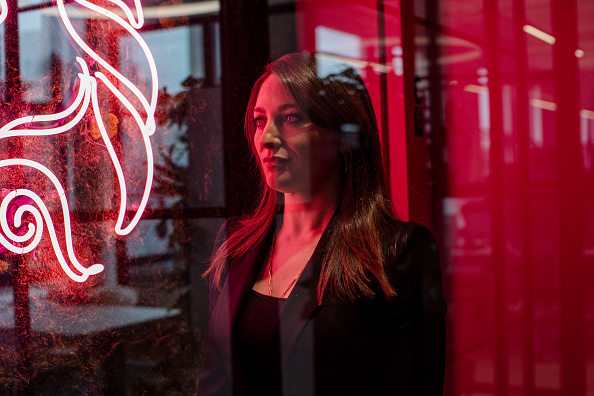Crypto lending and financial services companies have been at the forefront of the industry’s latest controversies ever since the collapse of the Terra stablecoin, with many drawing parallels between the web3 financial system and the broader markets in 2008. But not all protocols are created equal, and many that have sustained steep losses in the aftermath of that fiasco are centralized entities that indeed operate similarly to traditional market-makers.
This week on Chain Reaction, we interviewed Mary-Catherine (MC) Lader, chief operating officer of Uniswap Labs, the team behind one of the largest decentralized crypto exchanges. You can listen to the full interview below.
Lader explained that Uniswap itself is a non-custodial, open-source protocol governed by holders of its UNI token. This structure sets Uniswap apart from “centralized finance” platforms such as Celsius and Voyager, which hold users’ assets in custody on their behalf.
Uniswap Labs, the entity Lader works for, is a team of people dedicated to building on top of and improving the Uniswap protocol, she said, noting that other teams can also develop on it due to its open-source nature.
“If Uniswap Labs disappeared, and if all of our team went and did other things, then the underlying protocol will continue to exist,” Lader said.
With a centralized exchange, the entity in charge typically holds a central limit order book that tracks buys, sells, bids and other offers, and matches them, Lader said. The centralized exchange then takes a cut of each order in exchange for developing the technology to match trades and determine execution prices, she added.
“The fundamental difference in core innovation of Uniswap is that it let anyone create a market for anything, and [let] anyone become a market maker rather than relying on centralized and specific teams to be market-makers in an exchange,” Lader said.
“What that means is that the whole activity … of letting you exchange things, instead of it being managed by a group of humans and the technology that they’ve developed, you just swap with anybody and create a pool on this sort of open-source software on the Uniswap Protocol,” Lader said. Prices are determined algorithmically through the Uniswap Protocol itself, and the 0.3% fee users pay to swap tokens on the platform currently accrues to liquidity providers on the platform while the protocol itself does not take a cut, she added.
However, the Uniswap community is currently considering a proposal to add a protocol fee that would enable payouts to UNI token holders, a debate that has raised questions about what the decentralized exchange’s path to profitability could look like.
“That’s the part of what makes the protocol decentralized, is that this is all happening transparently in the open and [through] a governance forum where all the people who would benefit or perhaps be affected by it can weigh in,” Lader said.
You can hear more of our interview with Lader on the Chain Reaction podcast. Subscribe to Chain Reaction on Apple, Spotify or your alternative podcast platform of choice to keep up with us every week.
